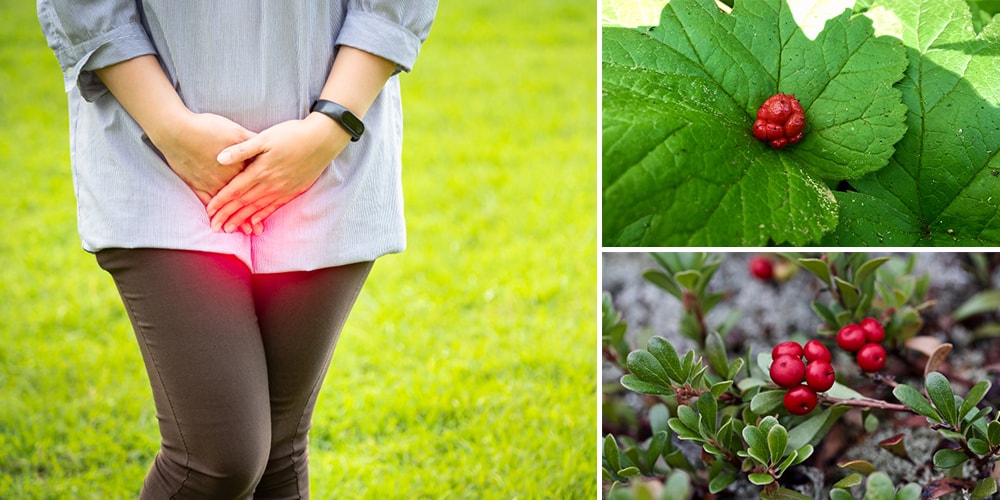
3 Herbal Remedies for UTIs
Urinary tract infections, or UTIs, are no joke. They are considered to be the second most common group of infectious diseases and over 150 million people a year are diagnosed around the world with UTI. This is why we should all be aware of the following 3 herbs for UTI.
One of the most common ways for doctors to treat UTIs is by administering antibiotics. Unfortunately, this has led to many of the bacteria that cause UTIs to become somewhat antibiotic-resistant now. According to studies, about 56% of all bacteria strains that lead to UTIs are antibacterial resistant on some level.
This has led to a push to research other kinds of treatments. However, the best way to treat UTIs, especially when caught early, is through natural means. This is where research is going now for scientists, but it is still severely lacking.
Most people know about cranberries, but did you know there are other herbal remedies one can take to fight off UTIs? While antibiotics may be necessary sometimes, there are some herbs you can use to fight off the infection if you catch it early enough, and some that may be ideal if you are someone who tends to get UTIs constantly.
Remember that it is always better to prevent UTIs than having to deal with UTI symptoms. Read on to see how the antimicrobial properties of these 3 herbs work in helping you.
Bearberry (Arctostaphylos uva-ursi)
Bearberry, also known as Kinnikinnick, is a shrub you can find in North America, Asia, and Europe. Its scientific name, uva-ursi, means “grape of the bears” in Latin. This name and the name “bearberry” come from the fact that it is a favorite snack for bears. It has little red or orange berries that bears enjoy eating.
However, it is the leaves that most benefit people. People have been using bearberry for centuries, especially in Native American culture, for health issues surrounding the bladder and urinary tract. It has been used as a diuretic, for UTIs, painful urination, and kidney stones.
Dried leaves from the bearberry shrub can be powdered and condensed into a tablet, placed into a capsule, or steeped to make tea. If you are getting supplements, look for one that has between 400 and 840 mg of arbutin in the extract. Otherwise, drinking a cup or two of bearberry tea a day is a good dose. Never go above ½ an ounce or about 15 grams at a time, because it can be toxic.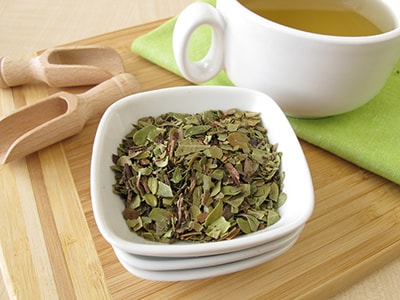
Studies have found that there is good science for this natural remedy. Bearberry leaves contain arbutin, which changes to hydroquinone in the body, which can reduce pain and inflammation in the urinary tract.
Bearberry also has antimicrobial and antibacterial properties. Studies have shown bearberry to be able to inhibit staphylococcus saprophyticus and E. coli, both of which are bacteria that are common causes of UTIs.
There haven’t been a lot of long-term studies on the dangers of using bearberries. Most of the time, it isn’t recommended to use it for more than a week or two at a time.
There have been mixed results in the studies surrounding the benefits of using bearberry leaves for UTIs. Based on the results, mixing bearberry with dandelion root in tea tends to work best for fighting off recurring UTIs, while using bearberry alone is best for fighting a one-off UTI. However, it seems to work best when taken at the first sign of infection. Delaying taking it can lead to it not being as effective or even not working.
Additionally, if you are pregnant, breastfeeding, or have diseases that affect the intestines, liver, or kidney, you may want to avoid bearberry as it can be harmful or worsen those conditions. It should also never be given to children.
⇒ Similar to Morphine: The Best Natural Painkiller that Grows in Your Backyard (Video)
Garlic (Allium sativum)
Garlic is an amazing herb. Not only is it used in many cuisines to add flavor to a meal, but it also has a large number of health benefits. It can fight fungi, viruses, and bacteria. Studies suggest that this is due to a compound in garlic known as allicin, which is useful for fighting against many different infections.
One such bacteria it fights well against is E. coli. However, while there has been some research into garlic’s ability to fight against UTIs, there hasn’t been a strong result yet. This also means that the ideal dosage and way to ingest garlic haven’t been studied yet.
There are many ways to consume garlic, including raw, cooked, whole, and in capsules and extracts. There doesn’t seem to be a dangerous dose within reasonable amounts. However, if taking capsules or extracts, it is best to respect the dosage presented on the container.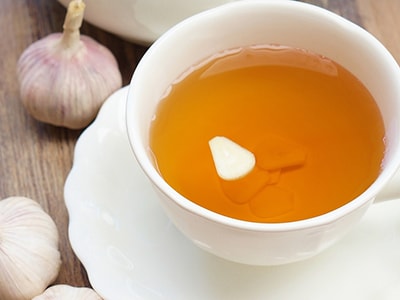
Side effects are minimal, and include bad body odor, bad breath, and heartburn. However, some people can also be allergic to garlic, so if you’ve never used this herb medicinally before, it is a good idea to take it in small doses first, just in case. People who are allergic to onions and leeks are often also allergic to garlic.
Researchers are starting to focus more on the benefits of garlic. Some simple studies have shown that even for strains of bacteria that are resistant to antibiotics, garlic has managed to fight against them. In fact, in one study, 82% of all antibiotic-resistant UTI bacteria were found to be susceptible to garlic.
Goldenseal (Hydrastis canadensis)
Goldenseal is most commonly found around the Eastern part of North America. Its roots and leaves are used to fight against infections and forms of inflammation, and it’s one of the most popular herbal remedies across the globe.
You can make teas, extracts, and capsules of this herb to help with all sorts of health conditions including colds, allergies, poor digestion, inflamed gums, and skin conditions. Goldenseal contains a variety of compounds, including hydrastine, canadine, and berberine, which all have antibacterial and anti-inflammatory properties.
Goldenseal is often already added to various feminine hygiene products, even though there aren’t a lot of studies to back up its health benefits yet. Still, it is worth mentioning as one of the top herbs for UTI.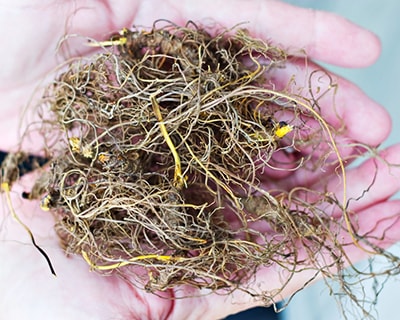
According to research though, berberine in goldenseal may have the ability to stop bacteria from sticking to bladder walls, which can reduce the likelihood of catching an UTI, or may make it easier to treat. It can also help prevent yeast infections.
Due to its numerous other health benefits, it is a great herb to take regularly. It can help to improve the immune system and stop recurring UTIs in those who find themselves constantly getting an infection.
Prevent UTIs Naturally
While herbal remedies can help manage UTIs, prevention is always the best approach. Incorporating these simple habits into your routine can reduce the risk of infections and support a healthy urinary tract:
- Stay Hydrated: Drinking plenty of water helps flush bacteria from the urinary tract before they have a chance to multiply. Aim for at least 8 glasses a day, or more if you’re prone to UTIs.
- Practice Proper Hygiene: Always wipe front to back after using the restroom to prevent bacteria from the anal area from spreading to the urethra. Avoid using harsh soaps, douches, or scented feminine products, as they can disrupt your natural balance.
- Urinate Regularly: Don’t hold in urine for long periods, as this allows bacteria to multiply in the bladder. Make sure to empty your bladder fully each time you go.
- Support Gut and Bladder Health: A balanced diet rich in probiotic foods (such as yogurt, kefir, and fermented vegetables) helps maintain a healthy microbiome, which can prevent bacterial overgrowth in the urinary tract.
- Choose Breathable Fabrics: Wear cotton underwear and loose-fitting clothing to keep the area dry and discourage bacterial growth.
By integrating these habits, you can significantly reduce your chances of developing UTIs in the first place.
How to Use Herbal Remedies for UTIs Effectively
To get the most out of natural UTI remedies, it’s important to use them correctly and consistently. Here’s how to maximize their effectiveness:
Timing Matters
- At the First Sign of Infection: Start drinking herbal teas as soon as you feel symptoms like burning, urgency, or discomfort. The earlier you act to reap in the benefits and antimicrobial properties of the herbs, the better.
- Morning & Night Routine: Drinking a cup in the morning can help cleanse the urinary tract, while a nighttime dose supports healing while you rest.
Dosage & Consistency
- Most herbal teas for UTIs should be consumed 2-3 times a day for at least a few days, even after symptoms improve, to ensure bacteria are fully eliminated.
- If using tinctures, follow dosage guidelines—usually 30-40 drops in water, 2-3 times per day.
- For long-term prevention, you can drink a milder infusion a few times a week rather than daily.
Can These Herbs Be Used Together?
- Many UTI-fighting herbs can be combined for enhanced effects. For example:
- Marshmallow root (soothing) + Uva Ursi (antimicrobial) + Dandelion (diuretic) create a comprehensive blend to fight infection while protecting the bladder lining.
- Adding a small pinch of cinnamon to your tea can boost antibacterial effects.
By being mindful of when, how, and how often you take these remedies, you can increase their ability to combat UTIs effectively.
Alternative Ways to Use Herbals for UTIs
Not everyone enjoys drinking herbal teas, and sometimes you may want a more direct approach. Here are additional ways to use these herbal remedies:
1. Herbal Sitz Bath
A warm herbal sitz bath can soothe irritation, reduce inflammation, and fight infection. Here’s how to make one:
- Boil 4-5 cups of water and steep a handful of dried herbs (like uva ursi, marshmallow root, or chamomile) for 20 minutes.
- Strain and pour into a shallow basin of warm water.
- Sit in the bath for 15-20 minutes, ensuring the affected area is fully submerged.
- Repeat once or twice a day for relief.
2. Herbal Tinctures for Convenience
If you’re on the go, a tincture might be easier than making tea. You can:
- Mix 30-40 drops into a small glass of water.
- Take it before meals or at bedtime for best absorption.
- Keep a small bottle in your bag for quick use.
3. DIY Herbal Capsules
If you dislike the taste of herbs, you can make homemade capsules:
- Use a grinder to powder dried herbs like uva ursi or dandelion.
- Fill empty gelatin or vegan capsules with the powder.
- Take 1-2 capsules, twice a day, with plenty of water.
By incorporating different application methods, you can choose what works best for you while ensuring effective treatment.
Safety Considerations and Potential Side Effects
Herbal remedies are powerful, but they aren’t for everyone. Keep these safety tips in mind before using them:
Who Should Avoid These Remedies?
- Pregnant and breastfeeding women should consult a healthcare provider before using UTI-fighting herbs, as some may stimulate contractions or affect milk production.
- People with kidney disease should avoid diuretics like dandelion root, as they can place extra strain on the kidneys.
- Individuals taking prescription medications (especially blood thinners, diuretics, or antibiotics) should check for potential interactions with their doctor.
Possible Side Effects
- Uva Ursi: Can be toxic in high doses—avoid long-term use.
- Dandelion: May cause mild digestive upset in some individuals.
- Marshmallow Root: Can coat the stomach lining and reduce absorption of medications—take it at least an hour apart from other drugs.
When to Seek Medical Help
While herbal remedies can help treat mild UTIs, you should see a doctor if:
- Symptoms persist beyond 48 hours despite treatment.
- You develop fever, chills, nausea, or lower back pain, which may indicate a kidney infection.
- UTIs become frequent (3 or more per year)—this may require additional testing.
Herbs are a powerful tool, but knowing when to use them and when to seek medical care ensures both safety and effectiveness.
Takeaway
There are plenty of natural remedies for UTIs. Most of them depend on prevention methods or catching the problem early, though, so they may not always work if you don’t start treating the infection once it is established. However, using one or a combination of these herbal remedies above can help those who can’t get rid of persistent and continuous UTIs.


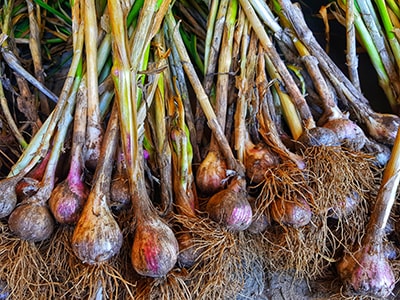
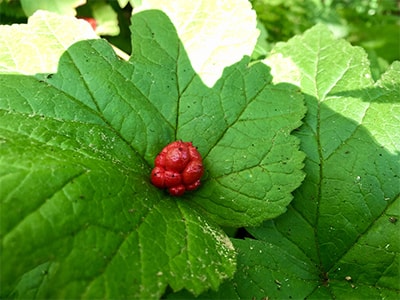


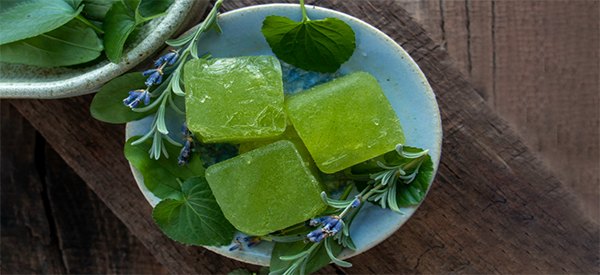

I used your recipe for Garlic and Honey. My question is the botulism factor? Should I have put some Cider Vinegar into the fermenting process? (They look lovely in the frig and I’m dying to eat some, but being a canner has me a bit afraid. Thank you, Iook forward to hearing from you!
Hi Jeannine,
Thank you for your comment! A great alternative is placing your honey garlic jar in the fridge.
Many blessings and good health!
Can I tincture this uva ursi with dandelion root for a good diuretic effect? Safety and dosage suggestions? My father 73, wants off his diuretic. Only other medication is a baby aspirin a day. He takes oregano oil, mullein tincture and garlic tincture daily 3x. Trying to figure out if adding that to his regiment would be safe synergistically? Another concern is taking uva ursi daily for maintenance??
One more thing to add to this regimen … While you’re waiting for the remedy to start clearing the UTI, I highly recommend Parsley Tea for the pain and discomfort. (I only use curly parsley, although flat leaf might work also). It works just like AZO and so much better for your body.
Thanks! I didn’t know about parsley tea. Usually marshmallow root is enough for mild symptoms, but I have always carried AZO as a backup.